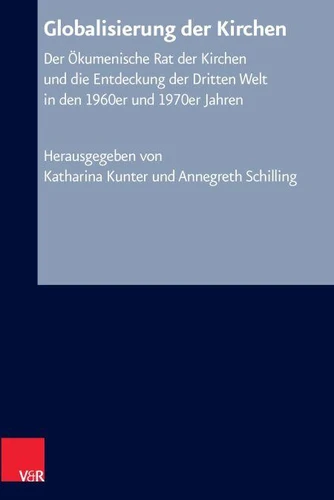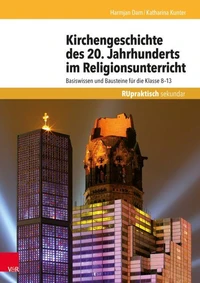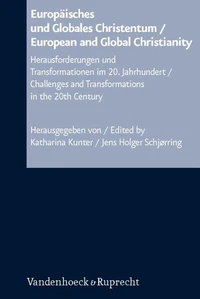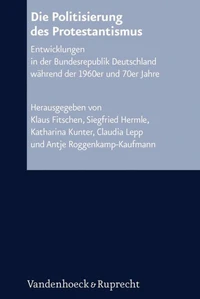Globalisierung der Kirchen. Der Ökumenische Rat der Kirchen und die Entdeckung der Dritten Welt in den 1960er und 1970er Jahren
Par : , , , ,Formats :
Disponible dans votre compte client Decitre ou Furet du Nord dès validation de votre commande. Le format PDF est :
- Compatible avec une lecture sur My Vivlio (smartphone, tablette, ordinateur)
- Compatible avec une lecture sur liseuses Vivlio
- Pour les liseuses autres que Vivlio, vous devez utiliser le logiciel Adobe Digital Edition. Non compatible avec la lecture sur les liseuses Kindle, Remarkable et Sony
 , qui est-ce ?
, qui est-ce ?Notre partenaire de plateforme de lecture numérique où vous retrouverez l'ensemble de vos ebooks gratuitement
Pour en savoir plus sur nos ebooks, consultez notre aide en ligne ici
- Nombre de pages379
- FormatPDF
- ISBN978-3-647-55773-1
- EAN9783647557731
- Date de parution22/01/2014
- Protection num.pas de protection
- Taille15 Mo
- Infos supplémentairespdf
- ÉditeurVandenhoeck & Ruprecht
Résumé
The churches are among the most important global actors, operating locally while also belonging to a larger transnational network. This can be seen in the World Council of Churches (WCC), the most important international representative of non-Roman Catholic Christianity, which first developed into a truly global non-governmental organization during the 1960s and 1970s. While the founding of the WCC in 1948 was above all the work of European and North American churches, representatives of the "Third World" took greater control of the organization in the wake of the decolonization, de-Westernization, and revolutionary upheavals of the early 1960s.
The positive effects of this more comprehensive globalization can be seen in the growing presence of representatives from Africa, Asia, and Latin America in the WCC. However, as this volume demonstrates in contributions from scholars in the fields of global history and theology, the process of globalization also led to new theological and cultural conflicts that threatened to destabilize the ecumenical movement.
New areas of international church cooperation included engagement with development questions, a commitment to human rights and the liberation of the oppressed, and the struggle against racism. In one of its most important contributions, this volume shows how the globalization of the churches gradually brought an end to the exclusively Western profile of the WCC and worldwide Protestantism.
The positive effects of this more comprehensive globalization can be seen in the growing presence of representatives from Africa, Asia, and Latin America in the WCC. However, as this volume demonstrates in contributions from scholars in the fields of global history and theology, the process of globalization also led to new theological and cultural conflicts that threatened to destabilize the ecumenical movement.
New areas of international church cooperation included engagement with development questions, a commitment to human rights and the liberation of the oppressed, and the struggle against racism. In one of its most important contributions, this volume shows how the globalization of the churches gradually brought an end to the exclusively Western profile of the WCC and worldwide Protestantism.
The churches are among the most important global actors, operating locally while also belonging to a larger transnational network. This can be seen in the World Council of Churches (WCC), the most important international representative of non-Roman Catholic Christianity, which first developed into a truly global non-governmental organization during the 1960s and 1970s. While the founding of the WCC in 1948 was above all the work of European and North American churches, representatives of the "Third World" took greater control of the organization in the wake of the decolonization, de-Westernization, and revolutionary upheavals of the early 1960s.
The positive effects of this more comprehensive globalization can be seen in the growing presence of representatives from Africa, Asia, and Latin America in the WCC. However, as this volume demonstrates in contributions from scholars in the fields of global history and theology, the process of globalization also led to new theological and cultural conflicts that threatened to destabilize the ecumenical movement.
New areas of international church cooperation included engagement with development questions, a commitment to human rights and the liberation of the oppressed, and the struggle against racism. In one of its most important contributions, this volume shows how the globalization of the churches gradually brought an end to the exclusively Western profile of the WCC and worldwide Protestantism.
The positive effects of this more comprehensive globalization can be seen in the growing presence of representatives from Africa, Asia, and Latin America in the WCC. However, as this volume demonstrates in contributions from scholars in the fields of global history and theology, the process of globalization also led to new theological and cultural conflicts that threatened to destabilize the ecumenical movement.
New areas of international church cooperation included engagement with development questions, a commitment to human rights and the liberation of the oppressed, and the struggle against racism. In one of its most important contributions, this volume shows how the globalization of the churches gradually brought an end to the exclusively Western profile of the WCC and worldwide Protestantism.







